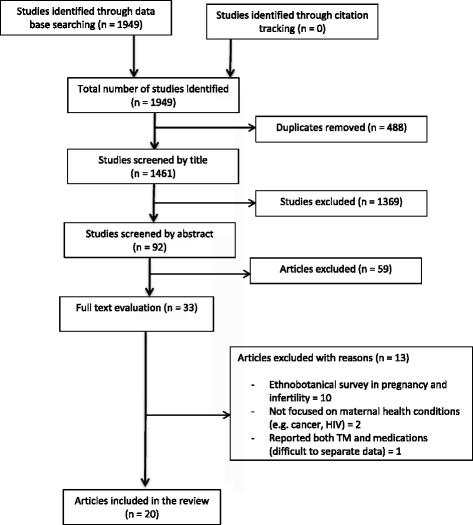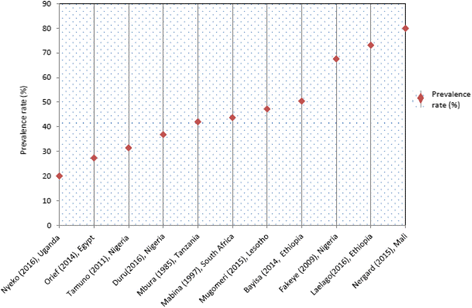The use of traditional medicine in maternity care among African women in Africa and the diaspora: a systematic review
- PMID: 28768534
- PMCID: PMC5541739
- DOI: 10.1186/s12906-017-1886-x
The use of traditional medicine in maternity care among African women in Africa and the diaspora: a systematic review
Abstract
Background: There is a paucity of literature describing traditional health practices and beliefs of African women. The purpose of this study was to undertake a systematic review of the use of traditional medicine (TM) to address maternal and reproductive health complaints and wellbeing by African women in Africa and the diaspora.
Method: A literature search of published articles, grey literature and unpublished studies was conducted using eight medical and social science databases (CINAHL, EMBASE, Infomit, Ovid Medline, ProQuest, PsychINFO, PubMed and SCOPUS) from the inception of each database until 31 December 2016. Critical appraisal was conducted using a quality assessment tool (QAT).
Result: A total of 20 studies conducted in 12 African countries representing 11,858 women were included. No literature was found on African women in the diaspora related to maternal use of TM or complementary and alternative medicine (CAM). The prevalence of TM use among the African women was as high as 80%. The most common TM used was herbal medicine for reasons related to treatment of pregnancy related symptoms. Frequent TM users were pregnant women with no formal education, low income, and living far from public health facilities. Lack of access to the mainstream maternity care was the major determining factor for use of TM.
Conclusion: TM is widely used by African women for maternal and reproductive health issues due to lack of access to the mainstream maternity care. Further research is required to examine the various types of traditional and cultural health practices (other than herbal medicine), the beliefs towards TM, and the health seeking behaviors of African women in Africa and the diaspora.
Keywords: Africa; Diaspora; Maternal health; Traditional medicine; Women.
Conflict of interest statement
Ethics approval and consent to participate
Not applicable.
Consent for publication
All authors gave consent for the publication of the manuscript.
Competing interests
The authors declare that they have no competing interests.
Publisher’s Note
Springer Nature remains neutral with regard to jurisdictional claims in published maps and institutional affiliations.
Figures
References
-
- Lu Y, Hernandez P, Abegunde D, Edejer T. The world medicines situation 2011. Geneva: Medicine expenditures World Health Organization; 2011.
-
- Kasilo OM, Trapsida J-M. Regulation of traditional medicine in the WHO African region. Afr Health Mon. 2010:25–31.
-
- Romero-Daza N. Traditional medicine in Africa. Ann Am Acad Pol Soc Sci. 2002;583(1):173–176. doi: 10.1177/000271620258300111. - DOI
-
- Truter I. AFRICAN TRADITIONAL HEALERS: cultural and religious beliefs intertwined in a holistic way. SA Pharm J. 2007;
Publication types
MeSH terms
LinkOut - more resources
Full Text Sources
Other Literature Sources
Medical



